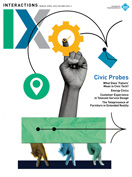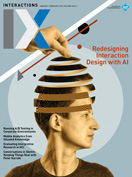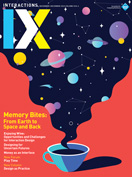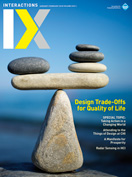Authors:
Gilbert Cockton, Simone Barbosa
As our first year as editors in chief ends, we have addressed five aims for Interactions: more disciplines, more countries and constituencies, more critical trends, and more on HCI's past and future. This issue focuses on historically informed critical futures across many disciplines, countries, and constituencies. Jonathan Bean's newly renamed Consuming Tech column reflects his home discipline; in Abracadabra, Jonathan Lazar moves into law. We are fortunate in being offered content that addresses our five aims—we have not had to recruit authors to focus on the past, critical futures, and a more diverse present. By chance, this issue has a strong focus on the future of HCI as both a discipline and a community that meets annually at the CHI conference. Ann Light highlights trends that have moved some critical HCI concerns from the margins to the main stage. We hope this wide range of voices and perspectives leads to discussion and debate through our blogs, social media, and the magazine's (still dormant!) feedback page, adding to the discussions that we have already had with authors during this issue's production.
The #CHI4Good focus from 2016 continued into CHI 2017, yielding some critical responses in our September–October 2017 issue that resume in this one. Everyone wants to make HCI and CHI better, and there is a welcome diversity of critical positions on future directions. Authors want future CHIs to provide better support for research through design (Will Odom and colleagues); become more accessible and diffuse (Maria Ferrario); and even to stand up to social injustice through fundraising (Madeline Balaam and Lone Koefoed) and political opposition (Paul Strohmeier). These authors want their CHI to be better for them and others, and it should. However, CHI isn't some monolithic, reified entity: It is a dynamic volunteer community, as is Interactions, which can be no better than its volunteer inputs. Most authors thus don't just demand that CHI get better: They also volunteer to take things forward. Some have already moved CHI out of the conference center in design fiction performances (Asreen Rostami and colleagues) and to Denver's Central Public library (Blog@IX). CHI isn't just for them, though, any more than it is just for us, you, or me. We should not ask what CHI can do for us, but what we can do for CHI.
HCI and CHI can be better for us, them, you, and me, with each of these dependent on who is looking and from where. "They" can be outsiders, the marginal, the oppositional, the unseemly, the agreeable, the inappropriately feminist. Or they can be practice-based design researchers, people in the Global South (Anirudha Joshi, Keyur Sorathia, Nithya Sambasivan and colleagues), research students around the world (Community Square), or indigenous groups on distant continents. "They" don't even need to be human: Lance Bennett and colleagues, and also Jenny Preece, focus on the environment and endangered species. "We" can be the mainstream, the successful, the responsible, the deserving; or scientists, true feminists, real researchers, passionate activists, or the people who made and make HCI and CHI. "You" can be one of "us" or "them" depending on your values and orientations. Even who "me" is may not be straightforward: Chris Frauenberger asks whether he can be both a scientist and an activist. You may be a woman, but the Next Billion forum reminds us that being a woman in the West has little overlap with being a woman in the Global South. However, even Western women are still on the wrong end of design assumptions, as Sean Munson notes in the Health Matters forum.
Assumptions fuel solutionism, an occupational hazard for designers. Gerhard Fischer's cover story exhorts us to frame problems widely in all their wicked complexity, rather than constrain problems for uncritical solutions. Similarly, in the Business of UX forum, Indi Young and Kunyi Mangalam argue for rich continuous studies of problem spaces that are independent of current product trajectories, which could exploit the hybrid "ethnomining" that Elizabeth Churchill discusses in her column. Still, problems do need solutions: Hui-Shyong Yeo and Aaron Quigley introduce us to newly accessible radar technologies, alongside another set of inspiring Demo Hour projects that contain the seeds of future well-designed solutions.
We hope that our first year of holding the reins of Interactions has been good for you. If not, please submit something to make our next year (even) better.
Gilbert Cockton and Simone Barbosa [email protected]
Copyright held by authors
The Digital Library is published by the Association for Computing Machinery. Copyright © 2018 ACM, Inc.







Post Comment
No Comments Found